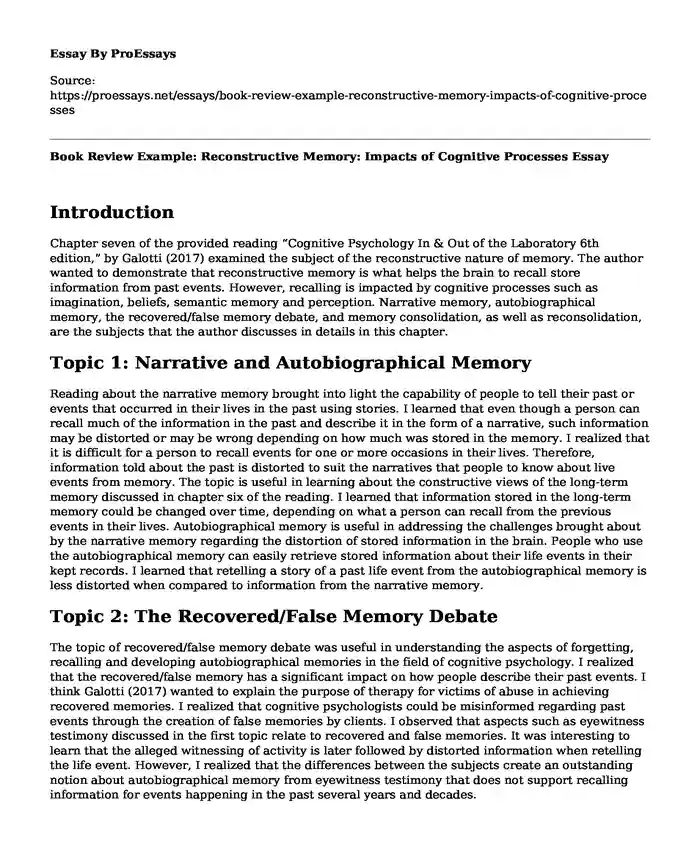Introduction
Chapter seven of the provided reading “Cognitive Psychology In & Out of the Laboratory 6th edition,” by Galotti (2017) examined the subject of the reconstructive nature of memory. The author wanted to demonstrate that reconstructive memory is what helps the brain to recall store information from past events. However, recalling is impacted by cognitive processes such as imagination, beliefs, semantic memory and perception. Narrative memory, autobiographical memory, the recovered/false memory debate, and memory consolidation, as well as reconsolidation, are the subjects that the author discusses in details in this chapter.
Topic 1: Narrative and Autobiographical Memory
Reading about the narrative memory brought into light the capability of people to tell their past or events that occurred in their lives in the past using stories. I learned that even though a person can recall much of the information in the past and describe it in the form of a narrative, such information may be distorted or may be wrong depending on how much was stored in the memory. I realized that it is difficult for a person to recall events for one or more occasions in their lives. Therefore, information told about the past is distorted to suit the narratives that people to know about live events from memory. The topic is useful in learning about the constructive views of the long-term memory discussed in chapter six of the reading. I learned that information stored in the long-term memory could be changed over time, depending on what a person can recall from the previous events in their lives. Autobiographical memory is useful in addressing the challenges brought about by the narrative memory regarding the distortion of stored information in the brain. People who use the autobiographical memory can easily retrieve stored information about their life events in their kept records. I learned that retelling a story of a past life event from the autobiographical memory is less distorted when compared to information from the narrative memory.
Topic 2: The Recovered/False Memory Debate
The topic of recovered/false memory debate was useful in understanding the aspects of forgetting, recalling and developing autobiographical memories in the field of cognitive psychology. I realized that the recovered/false memory has a significant impact on how people describe their past events. I think Galotti (2017) wanted to explain the purpose of therapy for victims of abuse in achieving recovered memories. I realized that cognitive psychologists could be misinformed regarding past events through the creation of false memories by clients. I observed that aspects such as eyewitness testimony discussed in the first topic relate to recovered and false memories. It was interesting to learn that the alleged witnessing of activity is later followed by distorted information when retelling the life event. However, I realized that the differences between the subjects create an outstanding notion about autobiographical memory from eyewitness testimony that does not support recalling information for events happening in the past several years and decades.
Topic 3: Memory Consolidation and Reconsolidation
In the third topic of Chapter seven, the author focused on memory consolidation and reconsolidation. It is a topic that related to the idea of neurological underpinnings of memory in chapter six. The author seemed to connect neurological underpinnings with changes in the brain that impact on the memory consolidation process. It was interesting to realize that memory consolidation is served by the hippocampus and amygdala of the brain structures discussed in the second chapter of the reading. It was astonishing to learn that cognitive psychologists can utilize the magnetic imaging techniques in establishing the activated human brain regions when learning and greater activation during retrieval of the stored information. The topic was useful to me in understanding approaches to psychotherapy methods that can be used to assist people in recovering from traumatic experiences. In that case, memory reconsolidation informed me on how to harness the malleability of the memory as a way of helping an individual to deal with traumatic events experienced in the past.
Conclusion
In conclusion, chapter seven of the reading was a useful section for understanding how the brain recalls information. The memory is regarded as a valuable tool that designs what information to remember and how to recall before retelling the narrative to an audience. It was worth noting that recalled information from past events is distorted depending on how an individual wants to send the message to the receiver.
Reference
Galotti, K. (2017). Cognitive psychology in and out of the laboratory. 6th Edition. Sage Publications, Inc. ISBN13: 9781506351568
Cite this page
Book Review Example: Reconstructive Memory: Impacts of Cognitive Processes. (2023, Sep 14). Retrieved from https://proessays.net/essays/book-review-example-reconstructive-memory-impacts-of-cognitive-processes
If you are the original author of this essay and no longer wish to have it published on the ProEssays website, please click below to request its removal:
- The Portrayal of Human Love in the Poem Lady Mary Wroth's Pamphilia to Amphilanthus
- Essay Sample on Mental Health and Substance Use Disorders in Adolescents in Alaska State
- Essay Example on Epic Journeys: Rama & Odysseus - Comparing Heroes' Traits
- Character Analysis Essay on Gatsby in 'The Great Gatsby'
- Essay Example on Santiago's Journey to Save for a Flock of Sheep
- Essay on the Long-Term Impact of Sri Lanka's Disaster: PTSD and Its Effect on Survivors
- Essay on Overcoming Resistance to Change: An Example From Kegan and Lahey (2001)







